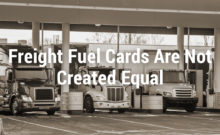Saving fuel is not just something saved for an economic crisis or people operating on a budget. Petroleum is a finite resource, and after the natural disasters we experienced over the summer, fuel prices are projected to rise. Saving fuel not only works for the energy industry at large, but for fleets and independent owner operators, reducing fuel consumption lowers immediate overhead costs.
Saving Fuel By Driving More Responsibly
Some within the trucking industry have speculated that the required ELD mandate, which goes into effect this month, has little to do with safety and everything to do on reducing fuel consumption. The truth is that the two are intertwined. Statistics show that for every five miles per hour over the average 65 mph speed limit actually decreases fuel efficiency by seven percent. Keeping within the stated speed limit allows truckers to save on fuel, while simultaneously reducing the chances of accidents and fatalities.
Aerodynamics Can Help Save On Fuel
No one is ever going to see a Class 8 commercial vehicle enter any NASCAR races, but there are little tweaks truckers can implement to improve aerodynamics. Aerodynamics are not about speed, in the case of highway driving. When it comes to trucks, aerodynamics reduce the strain placed on the engine, saving fuel along with wear and tear. Installing things like a cab deflector and an angled bumper can save on fuel, increase aerodynamics, and result in a reduction in fuel usage.
The Gas And Oil You Use Matter
One of the biggest keys to saving fuel has a lot to do with the petroleum products you use. First, every trucker should use the grade of motor oil recommended by the truck manufacturer, or better. This can improve mileage by up to three percent. Second, when pumping gas, try to fill the tank at a low setting. The faster you pump gas into your tank, the higher the amount of vapors and air, instead of actual fuel. In essence, you are not saving fuel when you pump fast. Instead, you are paying for a higher air mixture, and will get much lower miles per gallon.
Check Your Tires
If your tire pressure is low, you are not saving fuel. Low tire pressure causes your truck to work harder to get from place to place. The harder your truck has to work, the more fuel you are burning, and the faster your vehicle will wear out. Part of saving fuel means making sure your tires are inflated to the right pressure. Lower pressure means more fuel consumption. Higher puts you in danger of a blowout on the road.
Saving fuel can be accomplished through a few simple things that every trucker can do. If anything, taking steps to save on fuel means you are paying less at the pump, and taking more money to the bank.
At Express Freight Finance, we specialize in freight bill factoring services, as well as comprehensive fuel card plans for independent truckers. Contact us today at 801-890-6570 to ensure your operation grows successfully.






